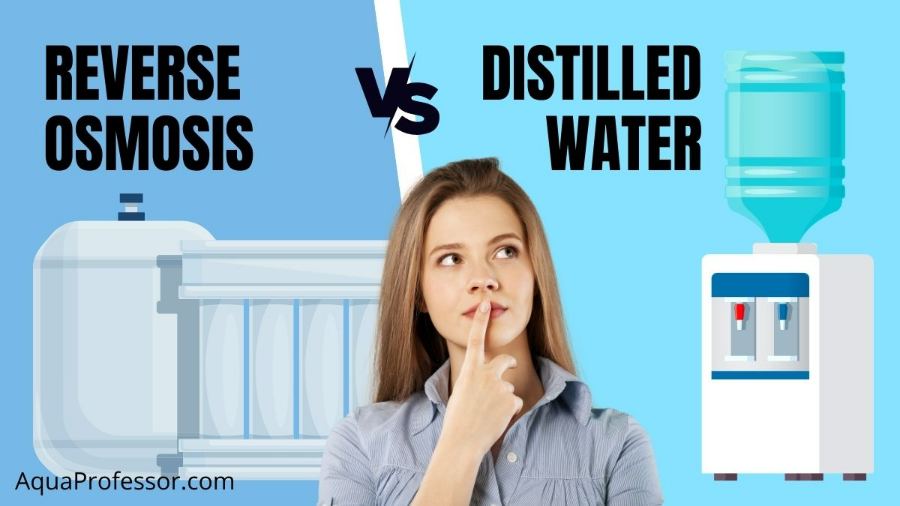
If you are looking for the latest research on the dissimilarities between reverse osmosis and distilled water, then you are in the right place.
Reverse osmosis water is deionized and demineralized, contains no harmful molecules or heavy metals, and is clinically proven safe for human consumption. Modern reverse osmosis systems offer remineralizing options to improve water taste and mineral content.
Distilled water is purified, demineralized water free from chemicals and metals with high vapor pressure. It is almost colorless and tasteless and is more suited for sanitizing medical equipment and storing reagents for lab experiments.
Continue reading for detailed reverse osmosis vs distilled water comparison to find which is best for home consumption.
Reverse Osmosis VS Distilled Water: Main Differences
| Factors | RO Water | Distilled Water |
| Process | Impure water molecules are passed through multiple semi-permeable fine membranes to remove all their contaminants and impurities, including solid particles. | An impure boiling water sample is set to evaporate its contaminants which are later condensed and distilled. |
| Uses | Simple and accessible options for drinking and cooking in households. Also used in manufacturing bottled water and maple syrups. | Used for sterilization, automobile batteries, deodorant, and infant formula. |
| Accessibility | Reverse osmosis systems are easily accessible for individual and public water systems and come in different versions at affordable prices. | Not easily available as the process is time-consuming and requires electricity. The public water system does not use it. |
| Cons of using it | It results in water wastage and can be costly to maintain. | It doesn’t have beneficial minerals, is more acidic, the process is energy-intensive, and can comprise lower boiling point contaminants. |
| Taste differences | It tastes better because the process adds extra minerals to the pure water. | It tastes flat because of the absence of minerals in it. |
Process
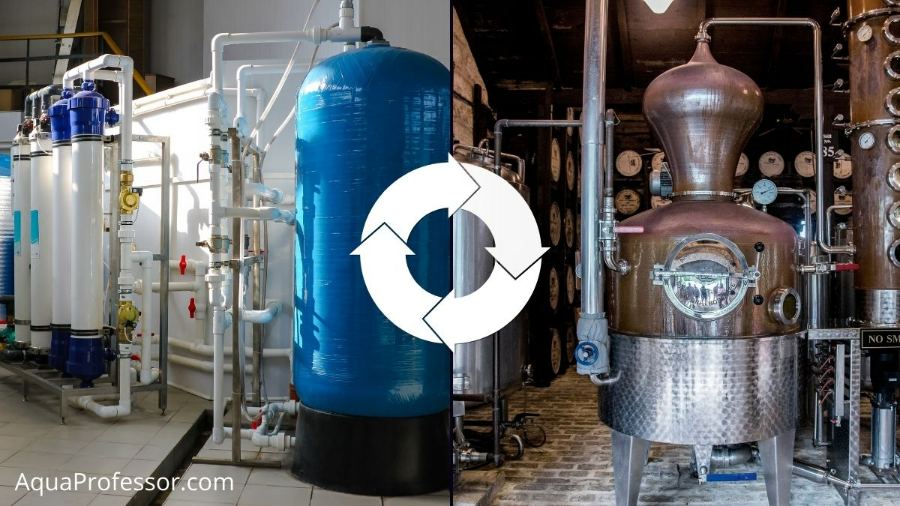
Distilled water and reverse osmosis water come from different processes. Distilled water comes from distillation, whereas RO-purified water comes from reverse osmosis. Both distillation and reverse osmosis have unique steps and filters for water purification.
Distilled Water
Distilled water comes through a method in which you evaporate contaminated water into gas and then return it to its liquid state through condensation.
After condensation, the water is distilled and separated from the contaminants, solid particles present within it, and finally, purified water.
The water distillation process eliminates every kind of chemical, mineral, and other inorganic substance from the water, including
However, the pure water in this filtration process lacks essential minerals, which makes it unsuitable for drinking if taken regularly instead of normal tap or faucet water.
So, will you drink distilled water regularly instead of reverse osmosis-processed regular tap water? Think again!
Reverse Osmosis Water
It comes through the reverse osmosis process. In this filtration process, water is passed through semi-permeable RO membranes (each RO membrane removes some contaminants or the other) that eliminate the tiniest impurities, dissolved solids, and heavy metals in your faucet water.
As an outcome of the RO process, you get healthy water and fit for drinking.
The reverse osmosis system uses multiple stages of filtration:
First, the pre-filter captures large dirt and dust particles from the water, thus purifying water from your tap. Next, the UV and activated carbon filter trap the other impurities, and finally, the reverse osmosis filter provides contaminant-free water. The result is that you get remineralized pure water.
Uses
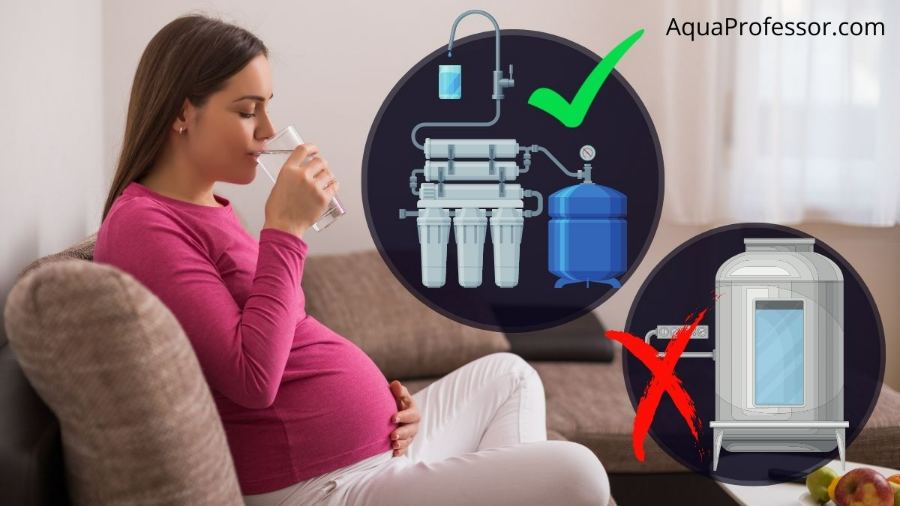
Distilled water and reverse osmosis water have unique benefits and use cases.
However, even though distilled water is safe from harmful and volatile chemicals and pollutants, essential nutrients such as calcium and magnesium are not present in this water.
So in the case of pregnant women or people suffering from mineral deficiency, drinking distilled water as being “purified” won’t help them in any way as they need calcium and magnesium for health improvement.
On the contrary, drinking reverse osmosis water benefits them as it comprises a sufficient quantity of essential and hydrating minerals.
Distilled Water
Here are some uses of distilled water:
Reverse Osmosis Water
Here are some uses of RO water:
Also Read: Best Fluoride and Chlorine Water Filters
Accessibility

There are significant differences in the accessibility of distilled and reverse osmosis water:
Distilled Water
Distilled water comes from specialized water dispensers or distillers. These treatment units can cost anywhere between $200 to $1200. The factors that decide the cost of the distiller are its size and performance level.
However, the electricity rates in the USA are as high as 10 cents/kWh, and each gallon of water requires nearly 3 kWh of electricity. So, you must spend nearly 30 cents to get 1 gallon of distilled water.
Also, the process is possible only when electricity is available. Moreover, it’s a time-consuming process. So, considering all these things, we can say that distilled water is not easily accessible for domestic use. It is not used by the public water system either.
Reverse Osmosis Water
Reverse osmosis water is attainable from reverse osmosis water filters, ready-to-use (as they remain connected to your tap water), easy-to-install, and affordable (through purchase or rent) units for domestic and commercial use.
Also, it’s available in various forms, and you may fit it under your sink, on any countertop, or anywhere else you want. Moreover, it can give you both hot and cold water (whichever you want) if you use dispenser-enabled systems. So, reverse osmosis water systems are easily accessible.
The public water system does not use the reverse osmosis filtration method directly. However, you can use it to purify your faucet water from the public water system.
Also Read: Best Arsenic Water Filters
Cons Of Using Them
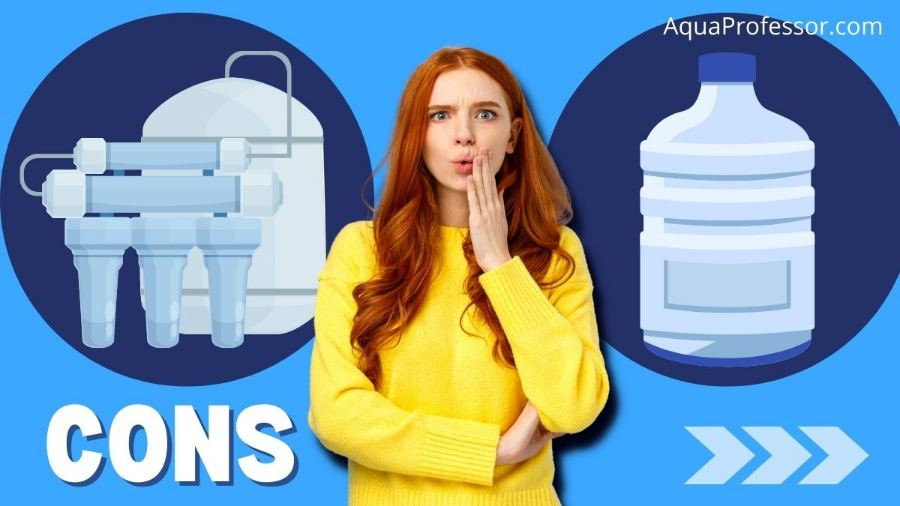
It’s time to discuss the disadvantages of distilled and reverse osmosis water for domestic and commercial uses.
Distilled Water
Reverse Osmosis Water
Pro Tip:
You can obtain reverse osmosis systems on rent with a free filter replacement guarantee and yearly maintenance.
Taste Differences

There is no competition between reverse osmosis and distilled water when it comes to taste:
Distilled Water
Distilled water tastes flat and bland because of the absence of minerals.
Reverse Osmosis Water
Reverse osmosis water tastes better because modern filtration units use remineralization to add extra healthy minerals to filtered water after removing dissolved solids, impurities, and contaminants.
RO vs Distilled Water: Pros And Cons
Reverse Osmosis Water
Pros
- Easy to access without quantity limits
- Better water taste with remineralization (healthy mineral content)
- Better suited for home consumption and related products
Cons
- A Reverse osmosis water purification unit requires regular maintenance
- It can be costly to install, and with a periodic requirement of cartridges
- Results in water wastage
So, reverse osmosis water is healthy for your family. But, the filter’s maintenance, repair, replacement, or installation may be time-intensive and costly.
Distilled Water
Pros
- No need for any connection with the water line
- Doesn’t need frequent maintenance
- Good for sterilization and cleaning
Cons
- Devoid of essential minerals present in RO water
- High electricity consumption
- Time-consuming
Distilled water is not a healthy option for regular consumption as it is acidic. However, it is purified from organic contaminants and pesticides, which makes it a good choice for infant formulas.
It is cheap to buy distilled water bottles, and you may install a distiller or distillation system that requires occasional maintenance.
Also Read: Deionized vs Distilled Water
Distilled vs Reverse Osmosis: Which Is Better?
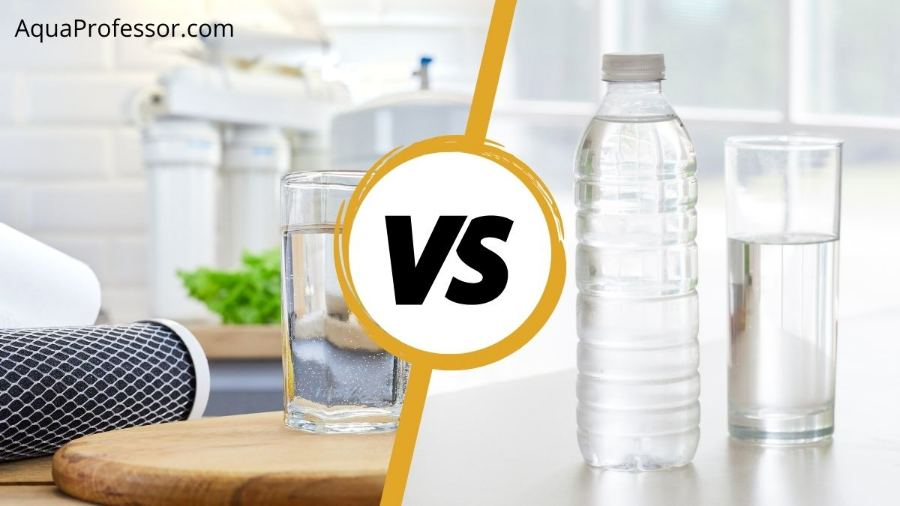
Both reverse osmosis and distilled water are purified water and thus free from various contaminants, bacteria, chemicals, dissolved solids, and pathogens.
Note:
You have to understand that both of them have different purposes. For instance, reverse osmosis water is better for drinking, whereas distilled water is better for medical purposes, cosmetics, automobiles, etc.
Also, no treatment unit gives both reverse osmosis and distilled water. Again, it’s because reverse osmosis and water distillation processes are entirely different.
Drinking reverse osmosis water will protect you from harmful contaminants and enrich your body with essential minerals. Also, you will like its taste, and the added minerals will quench your thirst well.
So, when it comes to drinking water, reverse osmosis water is the best.
Difference Between Reverse Osmosis and Distilled Water: FAQs
Is Distilled Water The Same As RO Water?
No, producing distilled water is entirely different from the reverse osmosis water generation process. The former uses evaporation and condensation to remove dissolved solids and impurities with boiling points higher than water’s, while the latter uses a reverse osmosis membrane with semi-permeable nature for separating finer impurities from the water supply.
Both purification methods can effectively remove microorganisms, volatile organic compounds, and heavy metals, but it’s safe not to use them interchangeably. Distilled water stuns your plant’s growth, and reverse osmosis shouldn’t be used for deodorant production.
It’s better to use reverse osmosis water for drinking and watering plants and water produced from distillation for sterilization and other relevant manufacturing processes.
Do Plants Like Reverse Osmosis Water?
Reverse Osmosis water is best for delicate plants like orchids, where you need to control their nutrient flow precisely. But, for non-delicate plants like aloe vera, you can use normal tap water.
Can I Use RO Water In A Humidifier?
Yes, you can use reverse osmosis water in a humidifier as it is free from impurities. But it’s best to use distilled and treated water for better humidity control and longer life of the device.
Can You Use Distilled Water for A CPAP Machine?
Yes, it’s great to use distilled water for a CPAP humidifier machine. It’s because the distillation process produces distilled water (sterilized water) without any microbial contamination. Also, distilled water prevents limescale buildup on various machines, including humidifiers.
For this reason, distilled water is used in CPAP machines in hospitals, labs, and factories.
Can I Use RO Water In Fish Tank?
Yes, you can use reverse osmosis water in aquariums. However, remineralization is mandatory before you pour reverse osmosis water inside the aquarium tank. Reverse Osmosis is a good way of filtering the contaminants in aquarium water, thus making it clean from harmful heavy metals.
Adarsh is a Health & Nutrition Sciences graduate with expertise in environmental health. He is associated with ventures like Glacier Fresh Filter and Simpure Filter Systems. Through Aqua Professor, he intends to provide helpful information to every home to help them make smarter decisions.
